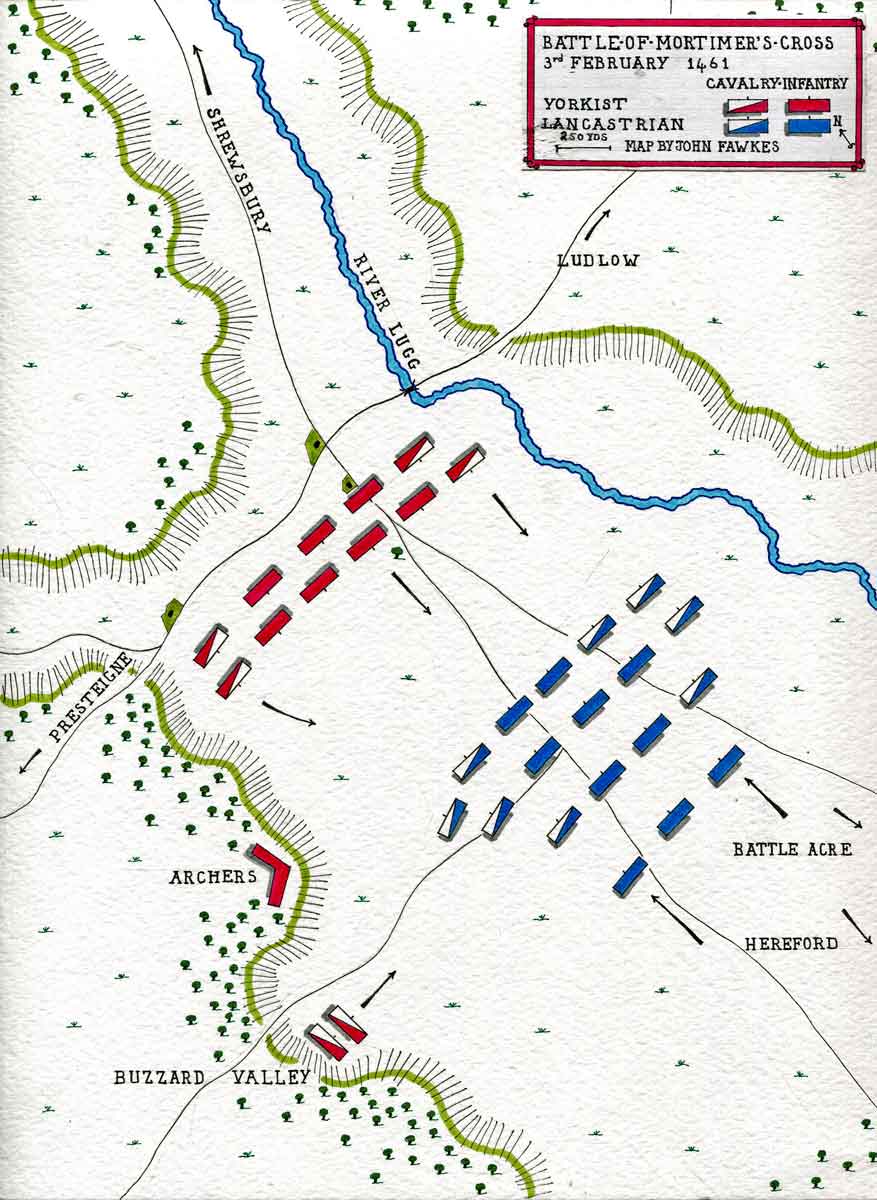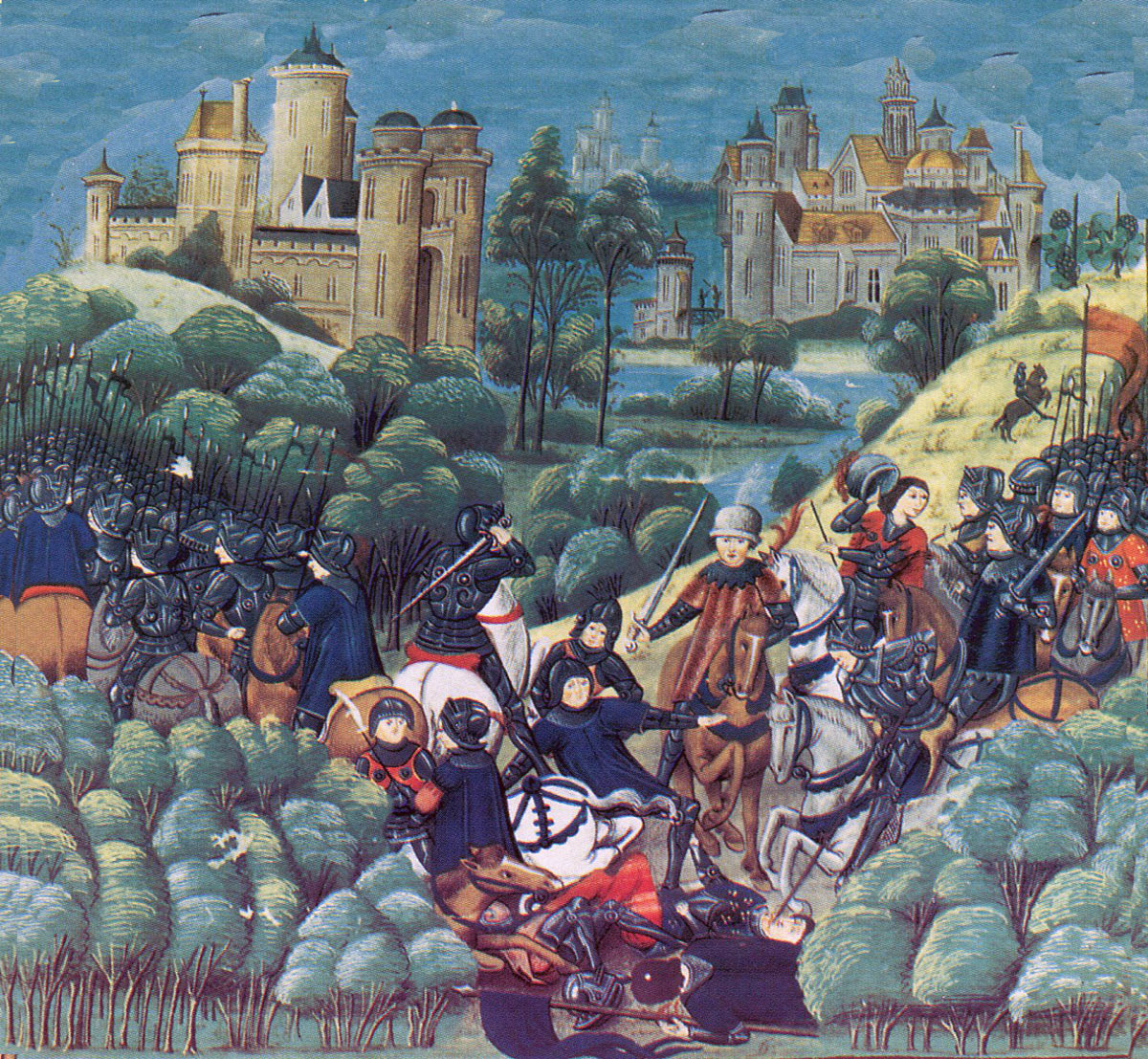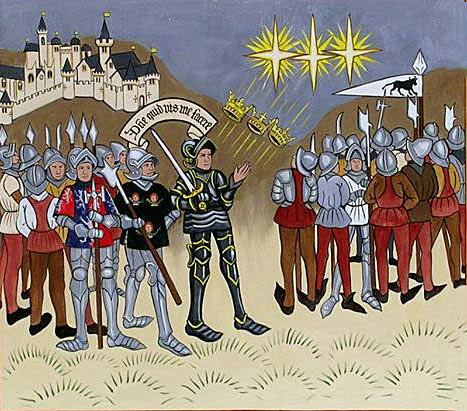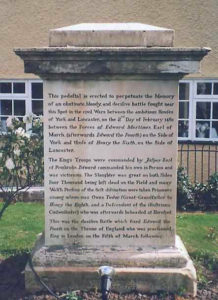Edward, Earl of March’s decisive defeat of Jasper Tudor, on 3rd February 1461, on the Welsh Border
The previous battle in the British Battles series is the Battle of Wakefield 1460
The next battle in the Wars of the Roses is the Second Battle of St Albans
Battle: Mortimer’s Cross
War: Wars of the Roses

Edward, Earl of March, Yorkist commander at the Battle of Mortimer’s Cross on 3rd February 1461 in the Wars of the Roses
Date of the Battle of Mortimer’s Cross: 3rd February 1461
Place of the Battle of Mortimer’s Cross: South-west of the Welsh/English Border town of Ludlow
Combatants at the Battle of Mortimer’s Cross: Lancastrians against the Yorkists
Commanders at the Battle of Mortimer’s Cross:
The Earl of March (elevated to the Duchy of Gloucester through the death of his father at the Battle of Wakefield and later in 1461 King Edward IV of England) commanded the Yorkist army.
Jasper Tudor, Earl of Pembroke, commanded the Lancastrian army, with the Earl of Wiltshire.
Size of the armies at the Battle of Mortimer’s Cross: The Lancastrian army probably comprised some 6,000 men; the Yorkist army some 5,000 men.
Winner of the Battle of Mortimer’s Cross: The Earl of March’s Yorkists, decisively.
Uniforms, arms and equipment at the Battle of Mortimer’s Cross: The commanders and their noble supporters and knights rode to battle on horseback, in armour, with sword, lance and shield.
Their immediate entourage comprised mounted men-at-arms, in armour and armed with sword, lance and shield, although often fighting on foot.
Both armies relied upon strong forces of longbowmen.

Jasper Tudor, Lancastrian commander at the Battle of Mortimer’s Cross on 3rd February 1461 in the Wars of the Roses
Handheld firearms were beginning to appear on the battlefield but were still unreliable and dangerous to discharge.
Artillery, although widely used in warfare, was heavy, cumbersome and difficult to move and fire.
There is no indication that either side at the Battle of Mortimer’s Cross possessed firearms.
The end of the Hundred Years War caused numbers of English and Welsh men-at-arms and archers to return to their home countries from France. The wealthier English and Welsh nobles were able to recruit companies of disciplined armed retainers from these veterans, forming the backbone of their field armies.
Background to the Battle of Mortimer’s Cross: Following the death of his father, the Duke of Gloucester, at the Battle of Wakefield on 30th December 1460, Edward, Earl of March, now the Duke of Gloucester, waited at Ludlow in expectation of an incursion from the Welsh port of Milford Haven by Jasper Tudor, Earl of Shrewsbury, with his retainers from West Wales and mercenaries brought from France by the Earl of Wiltshire and a body of Irishmen commanded by the Earl of Ormonde.
In the expectation that the winter weather would dictate the route the Welsh Lancastrian army would be forced to take, the Earl of March awaited the Lancastrians at Ludlow.
On hearing of the approach of Jasper Tudor’s and Wiltshire’s army, March moved forward to intercept the Lancastrians at Mortimer’s Cross some 8 miles to the south-west of Ludlow on the River Lugg, at the point where the road from Ludlow crosses the river.
———————————-

Map of the Battle of Mortimer’s Cross on 3rd February 1461 in the Wars of the Roses: map by John Fawkes
Account of the Battle of Mortimer’s Cross:
The information received by the Yorkists was that Tudor’s army was marching north along the bank of the River Lugg.
Triple Sun:
As the sun rose on 3rd February 1461 over the Yorkist army, the horrified soldiery saw there was not one sun, but three, in the sky.
The Yorkist soldiers did not know it, but the extreme cold, coupled with certain unusual characteristics in the air, was producing a phenomenon called a parhelion, or the appearance of three suns.
Seeing the panic spreading through his army, the quick-witted Earl of March announced that what his soldiers were seeing was a representation of the Holy Trinity and that it was an omen for their victory over the Lancastrians.
The Yorkist soldiers were re-assured and filled with enthusiasm for the coming battle.
The Earl of March drew up his Yorkist army to the south of the east-west road, in the quarter mile wide plain between the River Lugg and the bank that ran parallel to the river, with his left flank on the bank of the river and his right flank reaching to the bank.

15th Century Armour from the Wallace Collecction: Battle of Mortimer’s Cross on 3rd February 1461 in the Wars of the Roses
Yorkist archers occupied the wooded bank, forward of the main line, forming an ambush to catch the left wing of the approaching Lancastrians.
The Earl of March probably also concealed a squadron of mounted men in the small Buzzard valley on his right, beyond the archers.
It is likely that the battle began with a heavy discharge of arrows by the concealed Yorkist archers on the bank.
Such a discharge at a relatively short range is likely to have inflicted heavy casualties on the Lancastrian order of battle and caused a sudden swerve towards the centre of the army by the left wing, which in turn will have thrown the Lancastrian battle into confusion.
At this point, the Earl of March committed the rest of his army to an attack on the disordered Lancastrians, the Buzzard valley force taking the Lancastrians in the left rear.
The Lancastrian army was pushed against the bank of the River Lugg and there annihilated by the Yorkist charge.
Many of the Lancastrian troops, attempting to escape across the River Lugg at a point where there was no ford or bridge, will have been dragged under by their heavy fighting gear and drowned.
It seems clear that a substantial portion of the Lancastrian army fought its way back a half mile to their wagon lager, where they were again overwhelmed in the area known as ‘Battle Acre’.
The Lancastrian survivors thereafter fled back to West Wales pursued by the Yorkists.
Casualties at the Battle of Mortimer’s Cross:
Specific numbers both for the participants in the battle and the casualties are not known, but probably the Yorkist dead and wounded were few, while most of the Lancastrian army was destroyed.
It seems likely that around 2,000 Lancastrians were killed in the battle and subsequent pursuit.
As was the practice after the later Wars of the Roses battles, the senior Lancastrian leaders taken in the battle were executed, including Owen Tudor, father of Jasper Tudor, John Throckmorton and Henry Scudamore.
The Earl of Wiltshire escaped to be captured and executed after the Battle of Towton on 29th March 1461.

‘Sun in Splendour’, Edward IV’s badge after the Battle of Mortimer’s Cross on 3rd February 1461 in the Wars of the Roses
Follow-up to the Battle of Mortimer’s Cross: Edward, Earl of March’s victory at Mortimer’s Cross was overshadowed in military terms by Queen Margaret’s success over the Earl of Warwick at the Second Battle of St Albans on 17th February 1461 and the return of King Henry VI to his own, Lancastrian, side.
Nevertheless, the Earl of March’s increasing stature as a military leader put him on the path to the Throne of England as King Edward IV, a position he would achieve after the Battle of Towton.
Emblems of the Battle of Mortimer’s Cross: Following the Battle of Mortimer’s Cross and the symbolic significance of the appearance of the Triple Sun, Edward, Earl of March, adopted the Sun Emblem for his standard.

Barbute Helmet found in the River Lugg: Battle of Mortimer’s Cross on 3rd February 1461 in the Wars of the Roses
Anecdotes and traditions from the Battle of Mortimer’s Cross:
- The Battle of Mortimer’s Cross was fought on St Blaise’s Day (3rd February). St Blaise, an Armenian Christian, was beaten with iron wool combs and executed on 13th February 316 AD. St Blaise is reputed to have introduced wool combing into England.
- A barbute helmet was found in the River Lugg at Lugwardine. It is possible that this helmet was worn by a Lancastrian soldier attempting to escape across the river and washed downstream in the following years. The helmet is in Hereford Museum.
References for the Battle of Mortimer’s Cross:
Ludford Bridge and Mortimer’s Cross by Geoffrey Hodges
Battles in Britain by William Seymour
Wars of the Roses by Michael Hicks
Chronicles of the Wars of the Roses
British Battles by Grant
The previous battle in the British Battles series is the Battle of Wakefield 1460
The next battle in the Wars of the Roses is the Second Battle of St Albans


